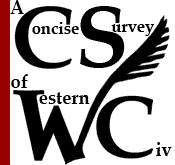Primary Sources for Chapter 4
Trial of the Hellenes: The Ancient Greeks, 1200 B.C. to A.D. 146
Study Guide | Art History | Links
The Founding of Cyrene: the ancient historian Herodotus describes the establishment of a Greek colony in northern Africa.
Content Questions: What forced the inhabitants of Thera to found a new colony?
Analysis Question: How do the colonizers interact with the natives?
Evaluative Questions: How do conflicts between invader and invaded echo throughout history?
Even more details on the origins of Cyrene can be found here (Wayback Machine).
The Polity of the Spartans: the ancient Athenian historian Xenophon offers a brief description of some aspects of Spartan society.
Content Question: What are the virtues which Lykurgus wanted to establish?
Analysis Question: How do these compare with Athenian virtues (see next)?
Evaluative Questions: How difficult was it to maintain the unique Spartan social behavior over time?
The Funeral Oration of Pericles: The leader of Athens describes the virtues of his society while memorializing the dead from the Peloponnesian Wars.
Content Question: What are the special virtues of Athens and its citizens according to this speech?
Analysis Question: How do these compare with Spartan virtues (see above)?
Evaluative Questions: How can a society hold such diverse cultural patterns?
Another translation can be found here.
Apology of Socrates in his own defense. Accused of blasphemy and corrupting the youth, the philosopher explains why he asks questions.
Content Question: What does Socrates say is his service to Athens?
Analysis Question: How would his behavior threaten those in power?
Evaluative Question: How should society deal with criticism?
Primary Source Project Links



